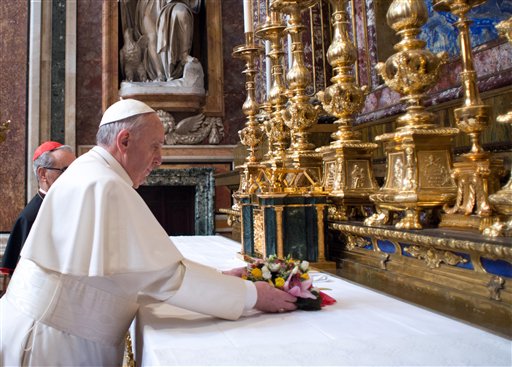Only a month into his papacy, Pope Francis is sending clear messages that he intends to make changes in the Church. And, while much of the focus of necessary change, at least for the cardinals who elected him, has been on the inner workings of the Vatican Curia, the pope himself is also looking to restore the moral integrity of the Church’s hierarchy, and, specifically, that of the priesthood.
Father Roger Landry reports in National Catholic Register that reform cannot come too quickly for a Church that has lost its “moral authority” due to clergy sex abuse and accounts of Vatican corruption. Landry observes as well that the Church’s scandals have also led to the perception that “living by the Church’s teachings forms freaks and moral monsters rather than saints.”
Landry suggests that, since the beginning of his days as archbishop of Buenos Aires, and into the first few weeks of his papacy, Francis has been mapping out the trajectory of priestly reformation. He zones in on seven aspects of the urgently needed renewal.
First, Pope Francis has already well set the stage for priestly simplicity. Though diocesan priests do not take a vow of poverty, as do priests who belong to a certain order, such as Jesuits or Franciscans, they are supposed to commit themselves to a simple lifestyle.
“In many places,” writes Landry, “this principle is given lip service, as members of the clergy drive fancy cars, frequent the finest restaurants, and live in exquisite digs.”
According to Landry, the former Cardinal Bergoglio set an example of simplicity by making the choice to live in a small apartment, and to use public transportation, rather than a comfortable car or high-end motorcycle. As Pope Francis, he has also chosen to live in a smaller suite in the Vatican guest house over the papal palace apartment.
Landry writes that the pope’s example “cannot help but lead priests to a sincere examination about the sincerity of their own spiritual poverty.”
Second, Landry points to then-Cardinal Bergoglio’s forceful warning of priests living a “double-life.” He observes that, when asked in a 2010 interview about the common saying in Argentina, “I believe in God, but I don’t believe in priests,” Bergoglio responded, “Many of us priests do not deserve to have them believe in us.”
As archbishop of Buenos Aires, Bergoglio would counsel wayward priests, and have them confront their situations, even if it meant a decision to leave the priesthood.
“What he absolutely wouldn’t tolerate, however, was priests living incoherent lives, because he knew how much that harms and scandalizes God’s people,” writes Landry.
Landry believes the third aspect of the reformation of the priesthood will be priestly accountability. He says that Pope Francis will be “calling, helping, and requiring priests to live with genuine priestly integrity.”
Landry says that Francis’ insistence on immediately paying his guest house bill while participating in the conclave “was a real sign that not even popes should consider themselves exempt from the demands of ordinary justice.”
Many Catholics have left the church due to experiences with priests who have either used the power associated with their priesthood to manipulate situations to their advantage, or have been openly hostile to the vows they take as priests. As a fourth path to priestly reform, Pope Francis is providing a template for an authentic revision of the use of clerical power, the “exact opposite of the haughty clericalism that in many places has hurt many and wounded the Church.”
“As he emphasized in the homily of his inaugural Mass, a priest’s authority must be linked to service…Like the Good Shepherd, the priest must seek to be the servant, not the lord, of the rest,” Landry states.
The fifth aspect of the reformation of the priesthood is the call for priests to be men of profound mercy. Landry says that Francis’ reminder that “God never tires of forgiving us is a clear call to priests never to tire in faithfully dispensing that mercy,” both within and outside of the sacrament of reconciliation.
Sixth, Pope Francis is calling all priests to live out the true spirit of Pope Benedict’s liturgical reform. Landry says that Francis will focus on the spirit of that reform, which is the fact that it is Jesus, and not the priest, who is the center of the liturgy.
Finally, Pope Francis will urge all priests to be “authentic pastors” and stewards of the New Evangelization.
“Pope Francis knows that every true reform in Church history has begun with a reform of the clergy,” writes Landry. “And he’s already hard at work in seeking to bring it about.”

COMMENTS
Please let us know if you're having issues with commenting.